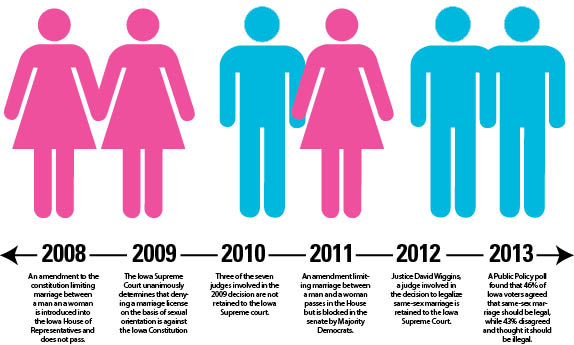Gay marriage threatened

Graphic: Mandy Kallemeyn/Iowa State Daily
A bill going through Iowa legislature could end same-sex marriage in the state. Residents are split on their feelings of the issue.
March 7, 2013
The tumultuous, never-ending debate about marriage equality continues this week in the Iowa General Assembly.
Iowa legislators have proposed a bill that could limit marriage between one man and one woman. This would overturn the 2009 court decision to allow same sex-couples to marry.
On Tuesday, a bill was introduced to the House of Representatives that proposed an amendment to the Iowa constitution. The amendment would define marriage as a legal union between one man and one woman.
Iowa is one of only 10 states in the United States that allows couples of the same sex to marry. Keeping this status, however, hasn’t been so easy.
In 2009, the Iowa Supreme Court unanimously voted to legalize same-sex marriage and called an amendment to the Iowa constitution limiting marriage between a man and a woman “unconstitutional.”
The Iowa Supreme Court supported their decision by citing section six of the Iowa Bill of Rights which states, “All laws of a general nature shall have a uniform operation; the general assembly shall not grant to any citizen, or class of citizens, privileges or immunities, which, upon the same terms shall not equally belong to all citizens.”
A year later in the 2010 midterm election, three judges who made the ruling were not retained to the Iowa Supreme Court.
Last fall, another justice who was involved in the legalization, David Wiggins, was up for retention. After a fiery campaign battle between the Iowa Bar Association and “No Wiggins” campaign formed by the Family Leader CEO, Bob Vander Plaats, Iowa voters chose to keep Wiggins on the Supreme Court.
Although Wiggins was retained, Iowa remains split. A poll by the Des Moines Register showed Iowans split on the issue, while a CBS poll showed that 52 percent of American’s are in favor of same-sex marriage.
This proposed amendment is not the first of its kind, either. There have been four attempts in the house to overturn the legalization of same-sex marriage since its 2009 decision.
Sen. Dennis Guth is one of the writers of a similar bill in the Senate. He said that his biggest problem with the legalization of same-sex marriage is that it never went through a legislation process.
“Seven unelected people got to decide this without any opposition. There were no Iowans or legislators involved. Marriage is an institution and to change an institution it must go through the legislation process,” Guth said.
Molly Tafoya, the communications director for One Iowa, called the bill “a shameful piece of legislation.” As one of the largest lesbian, gay, bisexual, transgender organizations in the state, One Iowa promotes marriage equality and civil rights to protect the LGBT community.
“This bill sends a terrible message to families. Thirty-five elected members don’t view all of Iowa’s families equally. Even though you pay taxes, go to church and attend PTA meetings, your family doesn’t matter to your legislators,“ Tafoya said.
The American Civil Liberties Union of Iowa believes that this bill infringes on the rights of gays and lesbians.
“Filing [the bill] represents an unfortunate attempt to get political traction by trying to delegitimize some Iowa families. Iowans have had enough of this kind of maneuver. We want to protect and support families, not tear them down,” said Rita Bettis, legislative director of the ACLU.
Both Bettis and Tafoya do not think that this bill will pass in the Senate.
In the last election, Iowa’s neighbor state Minnesota voted “no” against a proposed amendment to their state constitution defining marriage as only between a man and a woman, similar to the one introduced to the Iowa house this week.
Guth said he thinks a vote by the people could solve our marriage equality issues and end the debate, but that would take at least two years.
“I think a vote would end the debate at least in the legislature — there will always be someone unhappy on either side,” Guth said.






